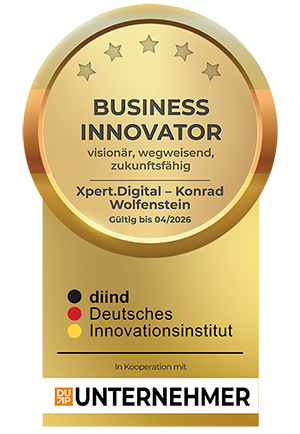Business thinking mistakes: The deceptive glow of English websites using the example of South Korea - more than just global content is required
Xpert pre-release
Language selection 📢
Published on: February 22, 2025 / update from: February 22, 2025 - Author: Konrad Wolfenstein

Business thinking mistakes: The deceptive glow of English websites using the example of South Korea - more than just global content - Image: Xpert.digital
English websites as a stumbling block in global business life
Why the misconception of English -language websites in South Korean business life is a costly thinking mistake
In today's globalized economy, it may seem tempting to use the international reach of the English at first glance and to believe that an English -speaking website is sufficient as a universal key to entering the market in South Korea. However, this assumption is a dangerous mistake that ignores the complex realities of the South Korean market, its deeply rooted culture, its unique digital landscape and the subtle nuances of the business label. For companies that are seriously considering making business contacts in South Korea and achieving long -term success, it is essential to understand the complex reasons why a comprehensive localization strategy is not only recommended, but is simply essential.
English websites often work globally, but are not automatically successful
The cultural pitfalls: more than just language
South Korean culture is rich in traditions and values that deeply shape business life. A purely English -speaking website is like a complex piece of music with just a few notes - it may be superficially recognizable, but the depth, emotion and the real essence are lost.
Suitable for:
- The central role of the national language in search engine optimization using the example of Hangul in South Korea
- Search engine optimization (SEO) in South Korea: Naver vs. Google and comprehensive content strategies
Confucian values and the importance of hierarchy and respect
The Confucian ideas, which has been shaping Korean society for centuries, emphasizes values such as respect for authority, hierarchical structures, harmony and the importance of long -term relationships. These values manifest themselves in a variety of ways in business. For example, great emphasis is placed on formal communication and compliance with the hierarchy in the Korean business world. Decision processes are often structured from top to bottom, and it is common for decisions to be made by managers and then passed on to the lower levels.
An English -language website that ignores these cultural nuances inevitably sends out a wrong signal. Korean business partners expect to find information on a website that reflects their cultural values and meet their needs. This includes, for example, the clear presentation of the corporate hierarchy, the specification of contact persons with correct titles such as „jangnim ”(director),“ busajang ”(Vice President) or“ sajang ”(CEO) and the use of a formal and respectful language. The lack of such culturally coded elements is quickly interpreted as a sign of disrespect, ignorance or even lack of seriousness.
However, it's not just about formal titles and hierarchies. The Confucian emphasis on " Inhwa " "(harmony) and" Jeong "(emotional binding, relationship) plays a crucial role in business life. Korean companies attach great importance to building personal relationships with their business partners. Trust and mutual respect are the cornerstones of every successful business relationship. A purely transaction -oriented, English -language website can neglect these important aspects and give the impression that the company is not interested in a long -term, trusting partnership.
Linguistic preference and trust in the mother tongue
Even if many South Koreans have knowledge of English, the preference for content in their mother tongue, especially in business and contractual contexts, is overwhelming. Numerous studies show that consumers and decision -makers perceive content in their own language as more trustworthy, credible and relevant. A study by the renowned Sungkyunkwan University in Seoul has shown that impressive 78 % of South Korean decision-makers classify websites in Korean as more trustworthy. This number speaks volumes and underlines the immense importance of localization beyond the pure translation.
However, the language preference is not only a question of trust, but also efficiency and comfort. Even if a Korean speaks in fluent English, it is undeniable that processing in the mother tongue requires less cognitive effort and thus enables a faster and deeper understanding. In complex business situations in which precision and clarity are of crucial importance, avoiding any linguistic misunderstandings by using the Korean language is essential.
In addition, it is important to understand that skills in South Korea are widespread, but are often limited to a certain level. Many Koreans have a passive vocabulary and can read and understand English texts, but active language skills, especially in written expression, can vary. This can lead to communication barriers and misunderstandings, especially in complex or technical areas. A Korean -speaking website, on the other hand, ensures that the message is clearly, precise and unequivocally conveyed to the target group.
Social etiquette in digital space: Avoid grease snacks
In South Korea, as everywhere in the world, digital communication is characterized by its own etiquette rules. What is considered acceptable or even informal and friendly in western cultures can be perceived as rude or disrespectful in Korea. A purely English -speaking website poses the risk of incorporating cultural fat cases and spoiling potential business partners.
A simple example is the salutation in emails or contact forms. While it is common in English to address people with the first name, this is inappropriate and rude in Korea, especially in formal business contexts. Korean business partners expect a formal salutation with the family name and a corresponding title. Ignoring this convention can give the impression of lack of respect and lack of professionalism.
Apparently neutral elements such as color design and visual language can also recover cultural pitfalls. Colors have different symbolic meanings in different cultures. For example, the color white in Korea is traditionally associated with grief and death, while red symbolizes happiness and prosperity. The careless use of colors on a website can therefore trigger unintentional emotional reactions and negatively influence brand perception. The visual language is also of crucial importance. Images that are perceived positively or neutral in western cultures can be culturally inappropriate or even offensive in Korea. A careful cultural adaptation of the visual elements is therefore essential.
In addition, courtesy formulas and welcome rituals play an important role in Korean communication. Korean websites often integrate ritualized polite formulas such as " Annyeonghaseyo " (hello), " Bangapseumnida " (nice, get to know them) or " Gamsahamnida " (thank you). These formulas are more than just mere phrases; They are an expression of respect, appreciation and social harmony. In direct translations into English, these formulas often lose their social function and their cultural context. A localized Korean -speaking website, on the other hand, can convey these cultural nuances authentically and effectively.
Technical SEO requirements: Naver dominance and local relevance
Search engine optimization (SEO) is a decisive factor for the online success of every company. However, anyone who believes that a global SEO strategy that focuses primarily on Google also leads to success in South Korea is huge. The South Korean search engine market is dominated by Naver, a search engine that differs fundamentally from Google in many ways.
NVER vs. Google: An unequal competition
With an impressive market share of over 60 %, Naver is the undisputed number one among the search engines in South Korea, while Google plays a significant subordinate role with a 30 % market share. However, this dominance of NAVER is not only a question of the number of users, but also the way naver works and contains content indexed and ranks.
Never is much more than just a search engine in the western sense. It is a comprehensive internet portal, an integrated ecosystem that combines a variety of services and content under one roof. In addition to the search engine, NaVer offers news, email, blogs, forums ("cafés"), communities, question-answer platforms (" Knowledge iN "), e-commerce platforms and much more. This integration of content and services shapes the way Naver search results present and how users find and consume information.
The naver algorithm differs fundamentally from that of Google. Naver attaches great importance to locally generated, Korean -speaking content and prioritizes it in the search results. Studies show that impressive 73 % of the top 10 rankings go to Naver on Korean-speaking pages. English content is systematically disadvantaged, since naver produces semantic analyzes at morphology level and English keywords often do not match Korean search intentions.
A clear example illustrates this difference: A search for "best smartphones" would probably provide a variety of international tech websites, test reports and product pages of global brands on Google. On the other hand, the same search, translated into the Korean as " 최고의 스마트폰 " ( choego-ui seumateupon ), primarily results from locals from local tech blogs, Korean online forums ("cafés"), user reviews and product pages of Korean dealers deliver. Companies that are not embedded in this local discourse whose websites are not optimized for naver and that do not offer Korean-speaking content remain invisible in the naver search results.
Cultural keyword optimization and semantic pitfalls
The keyword research for the South Korean market requires a deep understanding of the Korean language, culture and search habits. A direct translation of English keywords into Korean is often not sufficient and can even be counterproductive. Keywords must be culturally adapted and adjusted to the specific search intentions of the Korean users.
For example, the term "premium" in Korean (" 프리미엄 ") has a different connotation than in English. While "Premium" is often associated with exclusivity, high quality and luxury in the western context, the term in Korea can also cause negative associations such as "overpriced" or "showy". Successful brands in Korea therefore often use alternative terms to communicate quality and value, such as "" gadeukhan "(mature, rich)," ttokttokhan "(clever, intelligent) or" myeongpum "(masterpiece, exquisite product).
The way users are looking for in Korea can also differ from western search habits. Tools such as the Naver Keyword Planner show that long-tail keywords in Korean often use questions, such as " 어떻게 선택하나요 ?" ( eotteoke seontaekhanayo ? - "How do you choose?"), " 어디에서 살 수 있나요 ?" ( eodieseo sal su innayo ? - "Where can you buy?") Or " 사용 후기 " ( sayong hugi - "User Reviews"). A direct translation of English keywords misses these specific search intentions and leads to less visibility in the naver search results.
In addition, NAVER user evaluates engagement metrics such as bounce rate, length of stay and click-through rate (CTR) particularly strictly. Websites with a high bounce rate, a low length of stay or a low CTR are punished by naver, even if they offer relevant content for certain keywords. This underlines the importance of high -quality, user -friendly and culturally relevant website, which meets the expectations of the Korean users and invites them to linger and interact.
Xpert.digital on naver

Xpert.digital is listed on naver.com. Here with "Meta Quest 4 publication date" - Image: Xpert.digital
More about it here:
Linguistic barriers and loss of trust: more than just translation
The linguistic barrier is often the most obvious obstacle for companies who want to gain a foothold in South Korea. But the effects of linguistic barriers extend far beyond the pure translation of texts. They significantly influence trust, credibility and the perception of a company by Korean business partners and customers.
The illusion of English competence: misunderstandings and distrust
Although statistics show that a considerable part of the South Korean population has knowledge of English, it is important to critically question these figures and to consider reality in the business context. Studies indicate that around 53 % of South Koreans have fundamental English skills, but only a significantly lower percentage, about 12 %, actively uses the language in the business context. Even in multinational companies that work in South Korea, internal communication is predominantly in Korean.
A study by the AHK Korea (German-Korean Chamber of Commerce and Industry) showed that impressive 89 % of local decision-makers for business inquiries, which are only written in English, initially develop distrust. They suspect fraud, lack of seriousness or simply an impersonal, standardized approach. This distrust is not irrational, but is based on the cultural preference for Korean communication and the perception that companies that bother to communicate in Korean show more commitment and interest in the Korean market.
The discrepancy between passive and active language understanding is particularly critical. As already mentioned, many Koreans can read and understand English texts, but writing more of correct, nuanced and professional answers in English often causes difficulties. This leads to delayed reaction times, misunderstandings, misinterpretations and ultimately a loss of efficiency and trust in communication. In complex negotiations or in the clarification of technical details, linguistic misunderstandings can even endanger business qualifications or lead to costly mistakes.
Legal and administrative hurdles: Korean as an official language
South Korea's regulatory environment and state administration are clearly shaped by Korean. Laws, regulations, guidelines and administrative processes are written and carried out in Korean. Companies that work in South Korea must adapt to these linguistic framework in order to avoid legal and administrative hurdles.
The "Framework Act on Electronic Documents and Transactions" in South Korea, for example, stipulates that certain types of electronic documents such as contracts, import certificates and compliance documents must be available in state-certified Korean. Incorrect or imprecise translations in these documents can lead to legal sanctions, fines or even loss of business licenses.
A concrete example of the serious consequences of linguistic mistakes in the legal context is the case of a German mechanical engineer, whose imprecise translated security instructions led to an import stop in South Korea in 2019. The Korean authorities complained that the English safety instructions were not sufficiently clearly and understandably translated into the Korean, which was a potential security risk for Korean users. This case illustrates that it is not enough to simply translate documents; They must also be culturally and legally adapted to meet the local requirements.
The psychological dimension of building confidence: more than just rational arguments
Trust is the currency of business life, and this applies in particular to South Korean business culture, which is strongly shaped by personal relationships and emotional bonds. A website is often the first contact point between a company and potential Korean business partners or customers. Therefore, the website plays a crucial role in building trust and credibility. However, a purely English -speaking website can unintentionally emit signals that undermine trust and make it difficult to build up long -term relationships.
Cultural coding of professionalism: details that make the difference
In South Korea, professionalism is often defined by details that may escape western companies or dismiss them as unimportant. However, these details are of crucial importance for the structure of trust and conveying competence and seriousness.
This includes, for example:
" Jeong "-Based relationships
As already mentioned, personal relationships (" Jeong ") play a central role in Korean business life. A website that emphasizes the value of relationships, emphasizes local partnerships or mentions social responsibility projects (CSR) in Korea can significantly increase the company's credibility and sympathy of the company in the eyes of Korean users. The mention of collaborations with Korean universities, NGOs or local companies shows a real commitment to the Korean market and the Korean society.
Visual hierarchy and team presentation
Korean websites often place more emphasis on team photos, the presentation of the company's history and the presentation of employees than on individual expertise or testimonials. This reflects the Confucian emphasis on collectivism and harmony. The visual representation of the team and the emphasis on common corporate values can trust and a feeling of belonging among Korean users.
Reviews and social proof: use local valuation platforms
South Korean consumers and business partners attach great importance to recommendations, reviews and social proof. Impressive 92 % of South Koreans check at least three local valuation platforms (such as Naver Blog, KakaoStory, Daum Cafe ) and online forums before making a purchase decision or making business contacts. The integration of local reviews, user reviews and testimonials on a Korean -speaking website can significantly increase trust and credibility. It is advisable to actively observe local evaluation platforms, to highlight positive reviews on your own website and, if necessary, react professionally and transparently to negative ratings.
An analysis of the IHK Korea (German-Korean Chamber of Commerce and Industry) has shown that localized web design and Korean-speaking content can increase the conversion rate by up to 300 %. In contrast, English pages in Korea are often perceived as "fleeting", "impersonal" or "incomplete". They give the impression that the company does not take the Korean market seriously and is not willing to adapt to the needs and expectations of the local target group.
The role of hyperlocality: closeness creates trust
In a globalized world, in which online companies often act limitless, the term "hyperlocality" may initially appear paradoxical. But especially in the digital space, in which anonymity and distance can prevail, emphasizing local references and adjustments are becoming more important. South Korean users attach great importance to hyperlocality and expect websites and online services that are aimed at them, take local peculiarities into account and convey a feeling of closeness and familiarity.
Address formats, phone numbers and local payment methods: Details that count
Hyperlocal adjustments include a variety of details that may appear trivial at first glance, but in total have a significant impact on the perception and trust of Korean users.
This includes in particular:
Address information according to the Korean postal system (" 번지“ – beonji )
The Korean address system differs fundamentally from western systems. Addresses are not structured according to street names and house numbers, but according to districts (" dong "), districts (" gu ") and " beonji " (of a kind of property number). The correct specification of addresses in the Korean format on a website signals the Korean users that the company is familiar with local customs and is trying to respect local standards. The use of false or incomplete address formats, on the other hand, can create confusion and give the impression of negligence.
Telephone numbers with country code (+82) and location index
The correct specification of telephone numbers with the Korean regional area code (+82) and the relevant local indicators is essential to enable Korean users to make easy contact. The specification of international telephone numbers without the correct formatting or the lack of local contact numbers can give the impression that the company is difficult to reach or is not present in Korea. Ideally, companies should specify local Korean phone numbers to reduce the inhibition threshold for calls and to give users the certainty that they communicate with a contact person in Korea.
Integration of local payment methods such as KakaoPay or Naver Pay
South Korea has a highly developed and diverse system of online payment methods. In addition to credit cards and bank transfers, local e-wallet solutions such as Kakaopay and Never Pay play a dominant role in e-commerce. The integration of these local payment methods on a website is essential for companies that want to sell products or services in Korea. The lack of local payment options can lead to Korean users cancel the purchase process or classify the website as unprofessional or not trustworthy. Studies by the Korea Consumer Agency have shown that the lack of local payment methods can reduce the trustworthiness of a website by up to 68 %.
However, hyperlocality goes beyond the pure adaptation of addresses, telephone numbers and payment methods. It also includes the consideration of local holidays, cultural events and seasonal special features in website design and content marketing. The adaptation of content to local events and interests shows the Korean users that the company is aware of, interested in local culture and has a real understanding of the needs and preferences of the Korean target group.
Strategic recommendations for successful market development: Localization as an investment in the future
The findings from the previous sections illustrate that a purely English -language website for the South Korean market is not only inadequate, but potentially counterproductive. Companies that want to be successful in South Korea have to pursue a comprehensive localization strategy that goes far beyond the pure translation of texts. Localization is not a mere cost center, but a strategic investment in market success that pays off in the long term.
Comprehensive localization beyond language boundaries: cultural, technical and content -related adjustments
A successful localization strategy for the South Korean market comprises three essential dimensions:
- Cultural auditing and cultural adaptation: Before a website or marketing campaign starts in Korea, a comprehensive cultural auditing is essential. All elements of the website and the marketing materials by local experts are analyzed towards their cultural relevance, adequacy and potential pitfalls. This includes the analysis of colors, pictures, symbols, narratives, wording and tonality. Cultural experts can provide valuable insights and give recommendations for cultural adjustments to ensure that the website and marketing messages are received positively and do not trigger unintentional negative reactions.
- Technical localization and SEO optimization for naver: The technical localization includes adapting the website to the technical conditions and preferences of the Korean market. This includes in particular:
Mobile-First design
In South Korea, internet access is mainly via smartphones. Therefore, a mobile-first design is essential to ensure that the website is optimally displayed on mobile devices and offers user-friendly mobile experience. Statistics show that over 98 % of Naver users access the search engine via smartphones.
Optimization of loading times
Korean internet users are used to fast loading times and have little patience with slow loading websites. The loading times should be optimized for less than 2 seconds to minimize bounce rates and maximize user satisfaction.
HTTPS encryption and data security
Data security and the protection of privacy are also important topics in South Korea. The use of HTTPS encryption and compliance with local data protection regulations are essential to build up trust among Korean users.
SEO optimization for naver
As already explained in detail, SEO optimization for naver is of crucial importance for visibility in the Korean search results. This includes the keyword research in Korean, the optimization of content for naver algorithms, the use of naver webmaster tools and the consideration of naver-specific ranking factors.
Content strategy and Korean-speaking content
A successful content strategy for the Korean market requires the creation of high-quality, relevant and culturally adapted Korean-speaking content. This includes:
Regular blog posts on Naver Blog
Naver Blog is one of the most important platforms for content marketing in Korea. Regular blog posts on Naver Blog on relevant topics that appeal to the interests of the Korean target group can increase visibility in the naver search results, steer traffic on the website and increase brand awareness.
Video content for YouTube and local video platforms
Video content is also extremely popular in Korea. YouTube is the second largest search engine in Korea to Naver. The creation of video content in the Korean language and its spread on YouTube and local video platforms such as Never TV can significantly increase the range and commitment.
Social media marketing on Korean platforms
South Korea has its own dominant social media platforms such as cocoa talk, cocoaory and naver cafe. A successful social media strategy for Korea requires presence and commitment on these local platforms and the creation of social media content that are tailored to the Korean target group.
Investment in long -term relationships: local presence, cultural training and partnerships
In addition to the extensive localization of the online presence, the investment in long-term relationships is another crucial success factor for the South Korean market. Successful companies often use hybrid models that include a combination of online and offline activities:
Local branches and representations
The opening of a local branch or representation in Korea signals long -term commitment and creates trust in Korean business partners and customers. A local presence also simplifies compliance processes, enables the development of personal relationships and facilitates communication and cooperation.
Cultural training and intercultural competence
The sensitization of the employees for Confucian business practices, Korean culture and intercultural communication is essential to avoid misunderstandings and build up successful relationships. Cultural training and intercultural training can help employees understand the cultural nuances of the Korean market and to interact effectively with Korean business partners and customers.
Strategic partnerships and collaborations
Cooperation with local influencers (" ppojangmachu "-local opinion leaders), local companies or Korean institutions can increase visibility in Naver searches, strengthen credibility and facilitate access to the Korean market. Partnerships with local influencers can be of great benefit, especially in the area of social media marketing and brand awareness.
Suitable for:
- Industry Influencer: Industry hub as a blog tip & topics portal for industry, mechanical engineering, logistics, intralogistics and photovoltaics
- Higher ROI with Brand Ambassador and Consumer like Industry Influencer Marketing – B2B & B2C Whitepaper Analysis – Top Info
Localization as the key to success in the South Korean market
The belief that an English -language website is enough to successfully establish business contacts in the demanding South Korean market is a dangerous misconception that ignores the complex realities of this unique market. The market closure in South Korea requires a deep understanding of the cultural values, the technical peculiarities of the naver-dominated search engine market, linguistic preferences and the psychological dimensions of the structure of trust.
From the algorithmic reality of naver search behavior to Confucian expectations of business relationships-the success factors in the Korean market are diverse and closely interwoven. A purely English -language website is not only a communication obstacle, but also sends subtle signals of lack of respect, lack of commitment and inadequate professionalism.
Companies that invest in professional location, offer cultural training for their employees, carry out technical SEO adjustments and build long-term relationships not only position themselves more visible and competitive in the Korean market, but also embody that respect for Korean values and cultural norms that the The basis for long -term partnerships and sustainable business success. Localization is therefore not just a tactical measure, but a strategic need for companies that really want to be successful in South Korea.
Our recommendation: 🌍 Limitless reach 🔗 Networked 🌐 Multilingual 💪 Strong sales: 💡 Authentic with strategy 🚀 Innovation meets 🧠 Intuition
At a time when a company's digital presence determines its success, the challenge is how to make this presence authentic, individual and far-reaching. Xpert.Digital offers an innovative solution that positions itself as an intersection between an industry hub, a blog and a brand ambassador. It combines the advantages of communication and sales channels in a single platform and enables publication in 18 different languages. The cooperation with partner portals and the possibility of publishing articles on Google News and a press distribution list with around 8,000 journalists and readers maximize the reach and visibility of the content. This represents an essential factor in external sales & marketing (SMarketing).
More about it here:
We are there for you - advice - planning - implementation - project management
☑️ SME support in strategy, consulting, planning and implementation
☑️ Creation or realignment of the digital strategy and digitalization
☑️ Expansion and optimization of international sales processes
☑️ Global & Digital B2B trading platforms
☑️ Pioneer Business Development
I would be happy to serve as your personal advisor.
You can contact me by filling out the contact form below or simply call me on +49 89 89 674 804 (Munich) .
I'm looking forward to our joint project.
Xpert.Digital - Konrad Wolfenstein
Xpert.Digital is a hub for industry with a focus on digitalization, mechanical engineering, logistics/intralogistics and photovoltaics.
With our 360° business development solution, we support well-known companies from new business to after sales.
Market intelligence, smarketing, marketing automation, content development, PR, mail campaigns, personalized social media and lead nurturing are part of our digital tools.
You can find out more at: www.xpert.digital - www.xpert.solar - www.xpert.plus



























